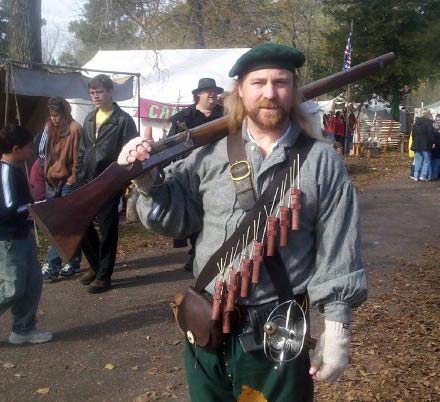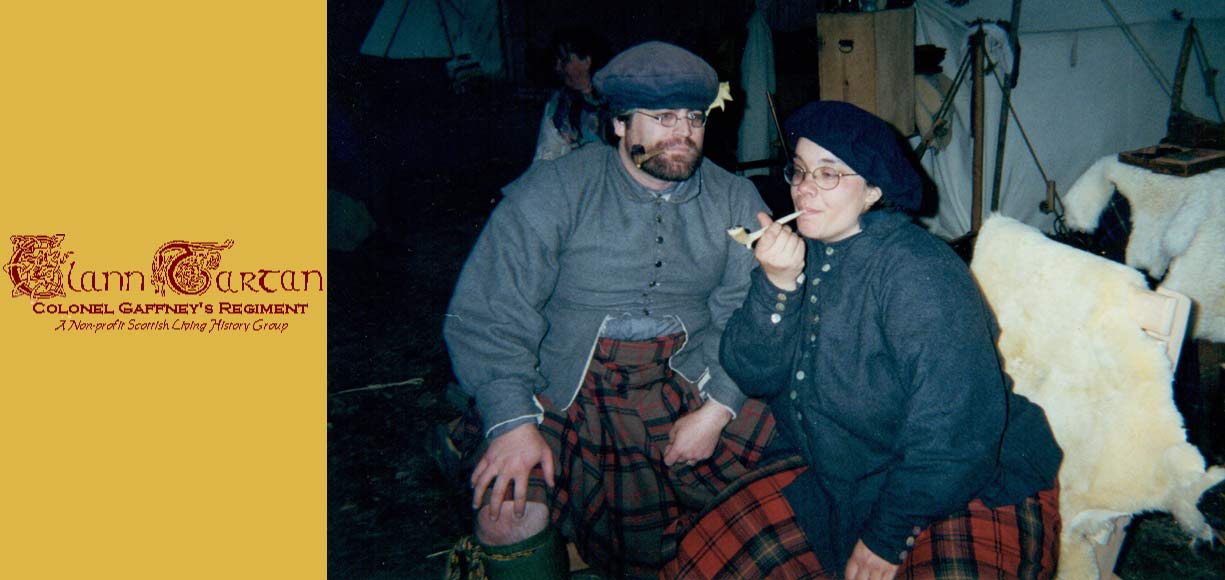Timeline of the Thirty Years War
This is a chronology of the 30 Years War in an outline form. Given it's nature it won't be detailed about either events or persons, but it should give an overview of the war and where the people we reenact fit into it. At the end I'll offer some interpretation of the history and how the Scots would have viewed things.
- PREWAR
- The war started about a hundred years after the reformation started
- People living at the time were expecting a major war to break out, though probably not as big a war as occurred
- A Spanish/Dutch truce was set to expire in1621
- Religious strife within the Holy Roman Empire (HRE) had the various states on the edge of war for years before hand
- The Hapsburg dynasty ruled Spain, Portugal, parts of HRE, some Italian states, and the Spanish Netherlands (Belgium)
- Everyone else, even other Catholics, feared the Hapsburgs growing so powerful
- Spain wanted land route Italy-Alps-Rhine
- The religious divisions of Europe were about the same as now, but were not yet stable, nor was religious tolerance tolerated
- Ferdinand Hapsburg, archduke of Styria in Austria, was an ardent Catholic who wanted HRE to be a centralized state
- The various princes in HRE particularly the Protestants, wanted to remain a loose confederation in which the emperor had no real power
- Seven electors
- One elector was King of Bohemia, open
- Archduke of Styria an elector, got elected King of Bohemia
- Ferdinand imposed Catholicism
- 1618
- Ferdinand elected King of Hungary, assured of throne
- Protestants throw regents out window of Hradcany Palace, Prague, Bohemia
- Protestant army under Count Ernst von Mansfeld occupies PIlsen
- Imperial army sent to suppress rebellion
- 1619
- Emperor Matthias dies, Ferdinand becomes Ferdinand II
- Bohemians elect Frederick, Elector Palatinate as king
- Has ideas of becoming emperor himself
- Son-in-law of James I of Great Britain
- 1620
- Treaty of Ulm, Protestant Union and Catholic League
- Signatories agree to respect boundaries
- Protestants abandon Frederick
- British troops join Frederick in Bohemia
- Catholic League under Johann Tilly defeats Bohemians at Battle of White Mountain
- Revolt crushed
- Leaders executed, Protestants expelled
- 1621
- Truce ends between Spain and Holland
- Spain invades the Rhineland
- 2,000 British under Horace Vere sent to Rhineland
- 1622
- British garrison at Mannheim surrenders
- Count Tilly defeats protestant armies at Wimpfen and Hochst
- 1623
- The Prince of Wales, later Charles I tried to arrange marriage with Spain; talks failed
- Mansfeld recruits an army in Britain of which few ever get home, which made future recruiting difficult
- Emperor gave Palatinate to Duke Maximilian of Bavaria, Frederick out
- Papal troops occupy Valtelline, passage through alps
- 1624
- Charles arranges to marry sister of French king
- England declares war on Spain, not much happened
- 1625
- Christian IV of Denmark and Gustavus Adolphus seek English/French support for invasion of Germany
- They back Christian, Sweden goes back to war with Poland, Denmark invades Germany
- James I dies
- Ambrogio Spinola takes Breda from Dutch
- Albrecht Wallenstein placed in command of Imperial army
- Tilly invades Saxony
- 1626
- 2 Catholic armies, Catholic League; Tilly: Imperial army;Wallenstein
- Wallenstein's growing power scares the other Catholics including Ferdinand
- 3 Protestant armies belong to Mansfeld, Christian of Brunswick, and Denmark
- Charles I unable to raise money from parliament, tries other means, limited in involvement
- Mansfeld defeated by Wallenstein at Dessau
- Danes defeated at Lutter by Tilly
- Mansfeld and Christian of Brunswick die
- Peasant revolt in Austria
- 1627
- Christian IV withdraws to Denmark, loses land to Imperial army
- Catholic forces in near complete control of HRE
- 1628
- Wallenstein lays siege to Straslund in Pomerania
- The siege is raised by Swedish navy and advance of Danish army
- Danes slaughtered at Wolgast by Wallenstein
- 1629
- Peace of Lübeck, Denmark stays out
- Charles dissolved Parliament until 1640
- Never had money for large armies, little influence
- Edict of Restitution restores to Catholic Church property secularized after Peace of Augsburg 1555
- Sweden makes peace with Poland
- 1630
- Protestants defeated, look for foreign help
- Sweden invades Germany
- Recruitment of soldiers in Britain, conscription
- Ferdinand dismisses Wallenstein for Tilly
- 1631
- Destruction of Magdeburg
- Tilly planned on sacking city to resupply army
- City fell by assault
- Fires during sacking destroyed city, killing most, perhaps 20,000
- Shocked and rallied protestants behind Gustavus
- War more brutal, "Magdeburg quarter" becomes synonym for killing prisoners
- German protestants formed formal alliance with Sweden
- British troops join Gustavus in August
- Gustavus defeats Tilly at Breitenfeld
- First time protestants appear to have upper hand
- 1632
- Tilly killed at Donauwörth, replaced by Wallenstein
- Gustavus sends British home
- Gustavus killed at Lützen, near Nuremburg
- Queen Christina of Sweden, regent Axel Oxenstierna
- 1633
- Wallenstein defeats Swedish army under Thurn at Steinau in Silesia
- Swedes invade Bavaria under Bernhard , Duke of Saxe Weimar
- French move into Lorraine
- Charles crowned King of Scotland, nine years after becoming king
- 1634
- Wallenstein replaced by Matthias Gallas and assassinated
- Wallenstein cause of problems, disobeying orders, blocking supplies
- Conspired to change sides, become King of Bohemia
- Assassins were Scots, English, Irish
- Emperor's son Ferdinand, King of Hungary, becomes commander in chief of Imperial army
- Imperial Army defeats Swedes at Nördingen
- 1635
- French/Swedish alliance
- Peace of Prague between Emperor and Saxony
- War now Hapsburgs vs. France and Sweden
- 1636
- Swedes defeat Imperials at Wittstock
- Two Swedish commanders were Scots, Alexander Leslie and James King
- Imperials under Prince Octavio Piccolomini try to invade France, fail
- 1637
- Emperor dies, son becomes Ferdinand III
- Dutch under Frederick Henry of Orange take Breda from Spain
- 1638
- Breisach falls to Bernhard of Saxe-Weimar with French help
- Long siege, failed relief attempts
- First Bishops' War
- Scottish Presbyterians form a covenant to resist Anglican authority
- Covenanters controlled Scotland
- Veterans went home, Leslie in charge
- Charles unable to get the English parliament's cooperation for an invasion of Scotland to enforce Anglicanism, raises a small army with his own resources
- little fighting occurs, war is a stalemate
- 1639
- Swiss regain Valtelline passes in the alps, cutting off the Spanish land routes
- Swedes go into Bohemia
- Bernhard dies
- Charles tries again to raise an army without money from the English parliament
- The Covenanter army invades England
- Charles agrees to pay tribute for maintenance of Covenanter army on English soil
- The English parliament decides the Covenanters are allies against Charles, gives money to maintain the army
- 1640
- Things continued bad for Hapsburgs
- Frederick William becomes Elector of Brandenburg
- Portugal wins independence from Spain
- French control Alsace
- 1641
- Swedes defeats Imperial army at Wolfenbüttel
- Rebellion in Ireland
- 1642
- English Civil War breaks out
- Swedes under Lennart Torstensson defeat Imperials at Kempten, Schweidnitz, and 2nd Breitenfeld
- 1643
- French wipe out Spanish infantry at Rocroy
- Spanish power broken
- Emperor agrees to begin peace negotiations
- 1644-48
- Some fighting, Imperial allies collapse
- Spain makes peace with the Dutch
- Peace of Westphalia
- War ended
- Empire back to pre-war division
- France and Sweden most powerful nations
- Effect on Scots
- Charles' disputes with English parliament over taxation caused by need for money for involvement in 30 years war
- Perhaps helped lead to neglect of Scotland
- Attempts to reassert authority in religion led to the Covenant in Scotland and rebellion in Ireland
- Many who went to continent died, probably helped lead to disaffection from Charles
- Scots drawn into English Civil War, fight their own civil war, anti-royalists win and intervene in England on parliamentary side, later switch over to Charles
- Amidst the feuds and schisms, Oliver Cromwell's New Model Army defeats all comers, including the Scots
- Overview
- The war began principally as a religious war. Personal loyalties and dynastic ambitions played a part, but the war was Protestants versus Catholics to begin with. Nationalism never played a significant role, but the ambitions of competing nobles and royal families grew in importance as the war continued so that by the late 30's religion had little to do with it. Catholics fought Catholics when France went to war with the Hapsburgs, and the Protestant sects turned on each other like in England and Scotland. In 1630, Sweden was just entering the war and Gustavus was seen as a great Protestant hero, and he may have been their last hope since the other Protestants were soundly beaten. Eventually, the combined pressure of France, Sweden, and the United Provinces of the Netherlands wore down the Hapsburgs. A description of the carnage would take to long, suffice it to say that the population of the HRE dropped by roughly 1/4, some estimates put it higher. It's hard to understand from the modern view, but we must remember that despite the cynicism of some leaders, many people were sincere in their faith and became martyrs for its sake. Even some rulers put their positions at risk for their faith. Charles I, for example, preferred execution to conversion.
- The Scottish View
- Scotland was ardently Protestant. The majority were Presbyterians, an offshoot of the Calvinists. The official Church of Scotland was episcopal, like the Church of England (Anglican). This was the worship Charles I was trying to impose. Presbyterians rejected religious authority from above, believing laymen should choose their ministers. They rejected royal authority in religion and many were downright anti-monarchist, so violent opposition to the king was just waiting to happen. The people we reenact were primarily Presbyterian. They would likely have still viewed the war in religious terms. Recruiting would have been complicated due to the misfortune of previous armies and animosity toward the king (something to keep in mind should we ever reenact the Bishops Wars or the Civil War). Many of them were conscripts, but many were fighting from religious zeal or economic reasons, or some combination thereof. Since they were being recruited for Gustavus' army there were likely strict rules against prostitutes, swearing, blasphemy, and missing church. As strange as their religious intolerance may seem to us, we must remember the times they lived in. Most people took for granted that religious unity was necessary for political and social order, therefore dissension was a great public danger. Perhaps only the ruling classes thought in these terms, but the people we portray would have shared the sentiment if not the phrasing. They would likely have felt that tolerating other denominations was as bad as joining them, and that such tolerance put their own souls in danger.
- SOURCES
- The Thirty Years War : C.V. Wedgwood: Doubleday/Anchor Books 1961
- Charles I: The Personal Monarch: Charles Carlton: Ark Paperbacks 1983
- The Timetables of History : Bernard Grun: Simon&Schuster 1979
- The Lion in the North: John Prebble
- The Age of Reason Begins: Will and Ariel Durant: Simon&Schuster 1961

